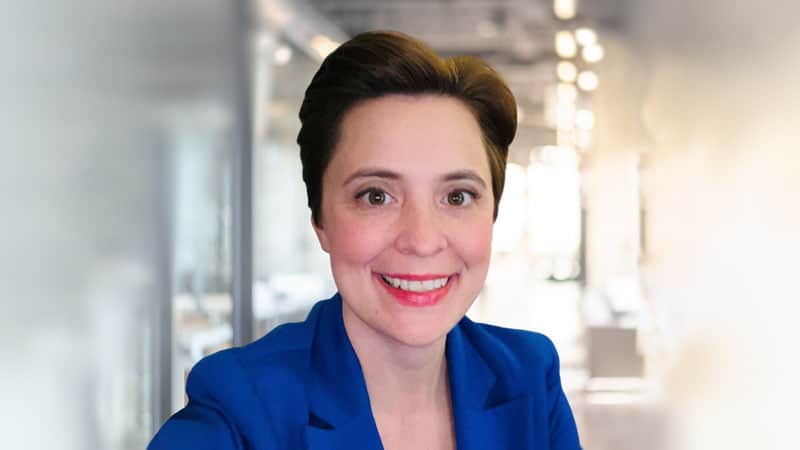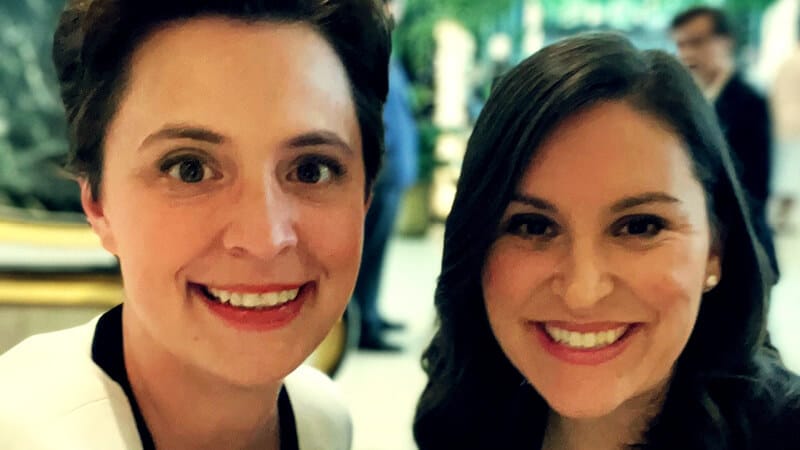Called to Protect the Vulnerable
Ashleigh Chapman
Juris Doctor ‘12
Human Rights Lawyer, Social Entrepreneur & USA Today “Women of the Year” Honoree

Human rights lawyer Ashleigh Chapman discovered her calling at the age of 11. Her parents had taken in three young children “who had experienced nearly every possible form of abuse and neglect,” which introduced her to “the horrors of all forms of exploitation.” Watching the children’s struggles as they healed from this trauma, and her parents’ struggles in trying to keep them safe, was transformative. It revealed to Chapman the calling God had placed on her life – to build solutions that would help communities prevent exploitation and care for victims. “It is the only thing I have woken up every day to pursue since,” says Chapman. Today, the Regent University School of Law alumna, lawyer and social entrepreneur has over 20 years of experience developing solutions that combat human trafficking and help to protect vulnerable populations. She was recently recognized by USA Today as one of its 60 “Women of the Year,” 2022.
The Women of the Year project recognizes “strong and resilient women who have been champions of change and courage.”1 Some are household names, such as Vice President Kamala Harris and gymnast Simone Biles, others are new – such as Chantelle Gary, who travelled across America with her family, distributing “COVID Care” packages to the homeless. Chapman was recognized for her efforts toward ending human trafficking.
Combatting Human Trafficking
A $150 billion industry worldwide – that’s human trafficking. In the United States alone, there are over 325,000 victims. “Human trafficking is closer than you think. But so are the solutions,”2 says Chapman. “You are uniquely positioned to make an impact,”2 she adds.
In 2013, she and fellow Regent Law graduate, Alana Flora, founded the global nonprofit Alliance for Freedom, Restoration, and Justice (AFRJ) to build solutions that have helped thousands of advocates and communities across the globe. These include AFRJ itself, Freedom Council, Engage Together, Justice U, and Altus Solutions, Inc. Together, these initiatives provide a multi-pronged approach toward fighting human trafficking by engaging business leaders (Freedom Council), individuals and communities (Engage Together), and by providing educational experiences (Justice U).
AFRJ is a non-profit organization that has “directly assisted over 10,500 anti-trafficking and justice advocates” 3 across the globe since its inception in 2013. Its work ranges from supporting rescue operations and restorative care programs to advising on policies regarding the protection of vulnerable populations and creating awareness. On the other hand, Altus Solutions, Inc. is a business that focuses on education, community collaboration and innovation.
Justice U leverages the power of digital badging and certifications to help individuals recognize and respond to human trafficking. Courses are available for healthcare providers, social workers, educators, business leaders, churches, civic clubs, foster care and adoptive parents, juvenile justice workers, concerned citizens, and more. “To date, we have over 4,600 learners in 47 states and 8 countries,” says Chapman. The Justice U Every Day Heroes Challenge aims to equip one million people to spot signs of human trafficking while going about their lives – at the store, airport, or even while crossing a street. It offers a free, one-hour online course on the signs of human trafficking and what you can do to help the victim.
“Human trafficking is closer than you think. But so are the solutions. You are uniquely positioned to make an impact.”
Can Chapman share the story of a particular life that was saved as a result of these educational and engagement efforts? There are many, she will tell you. One in particular involved a lady who attended a training organized by Chapman for business professionals in Minnesota. Two weeks later, while on a business trip to Texas, she overheard the manager of the hotel “taking an “order” from a man who came into the hotel explaining what “flavor” of woman he wanted delivered to his room.” It was clearly a sex trafficking operation. The lady called Chapman, who was able to reach out to an anti-trafficking law enforcement official in the area. As a result, an investigation and intervention were triggered that night. Chapman calls it “a powerful testament to the miracles that can happen when we get equipped to make a difference (such as in the case of the businesswoman who attended the training) and keep our eyes open to what is happening all around us, many times, in plain sight.”
Equipped for Excellence at Regent Law School

The need to become better equipped to reform systems of care led Chapman to Regent University’s School of Law. She became the director of a non-profit organization at the age of 19, helping thousands of at-risk children and youth. However, over the years, she became “increasingly frustrated” with lacking the tools she needed to reform systems of care for the vulnerable. “I told my husband ‘I think it’s time to pursue a law degree.’”
Not long after, she received a postcard in the mail from Regent Law with the tagline “Law is more than a profession. It’s a calling.” “And I thought – I could not agree more!,” says Chapman. She began pursuing her Juris Doctor degree at Regent University’s School of Law in 2009 and graduated Magna Cum Laude in 2012, receiving the faculty’s Most Outstanding Graduate Award.
During law school, she also helped to launch the Center for Global Justice®. She recalls Professor Jeffrey Brauch—who was the dean at the time—mentioning during a chapel service that the Lord had laid on his heart that “the law school should be doing something to address oppression and abuse in the world, including human trafficking, and to pray for what we might do.” It was the first week of her first year in law school. “I knocked on his door that afternoon to volunteer to help in any way I could, and together, we launched the Center for Global Justice® in 2010.” Chapman served as the center’s administrative director from 2010-2013, during which time they sent over 70 interns globally to work on justice issues, added new courses to the curricula and experiential learning opportunities, and hosted conferences and summits.
“In 2013, I believed it was time to branch out and build solutions that could help accelerate every community’s efforts to end human trafficking and protect the vulnerable,” says Chapman. So, she called on Flora. Not only had the two graduated from Regent’s law school together, but also had studied human rights abroad together. In 2013, they founded the global nonprofit AFRJ that has engaged and empowered thousands of human rights and justice advocates across the globe – and saved innumerable lives. In another Regent Law connection, professor Kathleen A. McKee was a founding board member of the nonprofit organization. Chapman calls her a “rock star” at the law school, who has been teaching courses related to human trafficking and managing advocacy clinics.
As for the USA Today recognition, Chapman considers it a team award alongside Flora. These Regent law alumni are driven by a higher purpose – to end human trafficking and protect the vulnerable. And thanks to their efforts, lives are being changed for the better.
References:
- Women of the Year. USA Today. https://www.usatoday.com/in-depth/opinion/2022/03/13/melinda-french-gates-simone-biles-women-of-year/6922631001/
- Human Trafficking Is Closer Than You Think. https://www.facebook.com/learnwithjusticeu/videos/human-trafficking-is-closer-than-you-think/670572003669713/
- How we got here. Alliance for Freedom, Restoration, And Justice. https://afrj.com/about/


